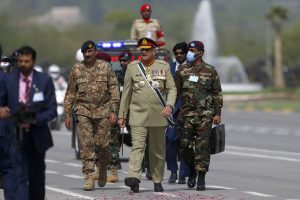The upcoming by-elections for 20 seats in the Punjab provincial assembly have gained immense significance in the context of the ongoing battle between the Imran Khan-led Pakistan Tehreek-e-Insaf (PTI) and Pakistan’s military establishment.
For the PTI, which was ousted from power in April this year, the Punjab by-elections present the first major opportunity for it to test the efficacy of its anti-establishment narrative. For months, PTI Chairman Imran Khan has belligerently targeted the country’s military leadership for its alleged role in orchestrating a no-confidence vote against his government in the parliament. To this end, Khan’s party has run a brutal media campaign to not only defame the military’s leadership but also undermine the ruling coalition and its support base.
Khan has been very effective in propagating the narrative that the security establishment colluded with local politicians and foreign powers to topple his government. This is the same narrative that Khan’s candidates have taken to voters in their campaigns in the upcoming by-elections. The impact of PTI’s anti-military campaign has been such that it seems that the PTI has a good chance of winning a majority of the seats.
Khan has been depicting the upcoming electoral bout in Punjab as a fight between good (his party) and evil (everyone else). For instance, in constituencies in Lahore, where elections are being held, PTI flyers say that voting represents a “choice between two ideologies” and a “struggle for real independence.”
To preempt rigging, the PTI is preparing for all sorts of scenarios.
The party has decided to file a petition in the Lahore High Court against alleged pre-poll rigging. It has accused the government of changing voters’ lists to benefit its candidates and blamed intelligence agencies for rigging efforts against the PTI.
The stakes are high for the PTI, which sees the electoral contest as a make-or-break event for its political future in Punjab – a province that decides the fate of any party with regard to forming the federal government.
A landslide victory for the PTI on July 17 can bring Khan’s party to power in Punjab. The ruling coalition led by the Pakistan Muslim League-Nawaz (PML-N) and the Pakistan People’s Party (PPP) in Punjab needs to win at least nine seats to achieve the 186-member majority in the provincial assembly for its government to survive. On the other hand, the PTI needs to win at least 13 seats to oust the present coalition government.
The PTI was in power in Punjab until a few months ago. Its Chief Minister Sardar Usman Buzdar resigned in March when Pakistan’s parliament took up the no-confidence motion to remove Khan. The PTI then decided to nominate Pakistan Muslim League-Quaid (PML-Q) Chaudhry Pervaiz Elahi as the new chief minister of Punjab. However, Elahi lost the election to PML-N’s Hamza Shehbaz, who was elected the new chief minister of Punjab in April after securing 197 votes.
Khan and his allies in Punjab had declared the election illegal, saying that PTI’s parliamentarians had also voted for the PML-N candidate. On PTI’s petition, the Election Commission of Pakistan (ECP) de-notified the PTI’s 20 dissident lawmakers, who had voted for PML-N’s candidate against their party directions in the Punjab chief minister’s election.
This left 20 vacant seats in the Punjab assembly. The July 17 by-election will decide the new provincial legislators. To weaken the PTI’s chances, the PML-N and PPP are jointly contesting the upcoming by-elections.
A win for PTI in the elections would mean that the party’s policy of putting pressure on the security establishment resonated with the people and that it was able to keep the state machinery at bay. If this happens, we should expect Khan to further accelerate his propaganda campaign against the state institutions in order to pressure the government to announce fresh general elections.
However, Khan faces several formidable challenges. He may have been able to put pressure on the military, but this may not translate into the PTI winning the by-elections. Khan may have preempted the security establishment’s actions to some extent over the last few weeks, but it doesn’t necessarily mean he has successfully overcome the state machinery being run and managed by the security elite in ways that the PTI cannot fathom.
After all, Pakistan’s security establishment has over the decades mastered the art of manipulating elections and political processes.
The July 17 elections are as important to the military as they are to Khan and the PTI. The military cannot afford to allow the resurgence of Khan at their own expense. It is naïve to expect the military, especially after it was bad-mouthed by Khan for months, would simply allow his party to win the elections.
The expected intervention by the military in the elections could come in many forms, including direct and indirect rigging, manipulation of voter lists, involvement of the Election Commission of Pakistan, court interference, violence at polling stations, delay in announcement of results, and more.
Above all, it should not be forgotten that the PTI is up against the PML-N, a party that has kept its dominance intact in Punjab for decades. A majority of the constituencies where polls are being held later this month are considered PML-N strongholds.
The July 17 elections will pave the way for the next phase of Pakistan’s politics. It will determine whether the country is going to early general elections or if the PTI has to make fresh plans to push back against the military’s efforts to sideline it.
































